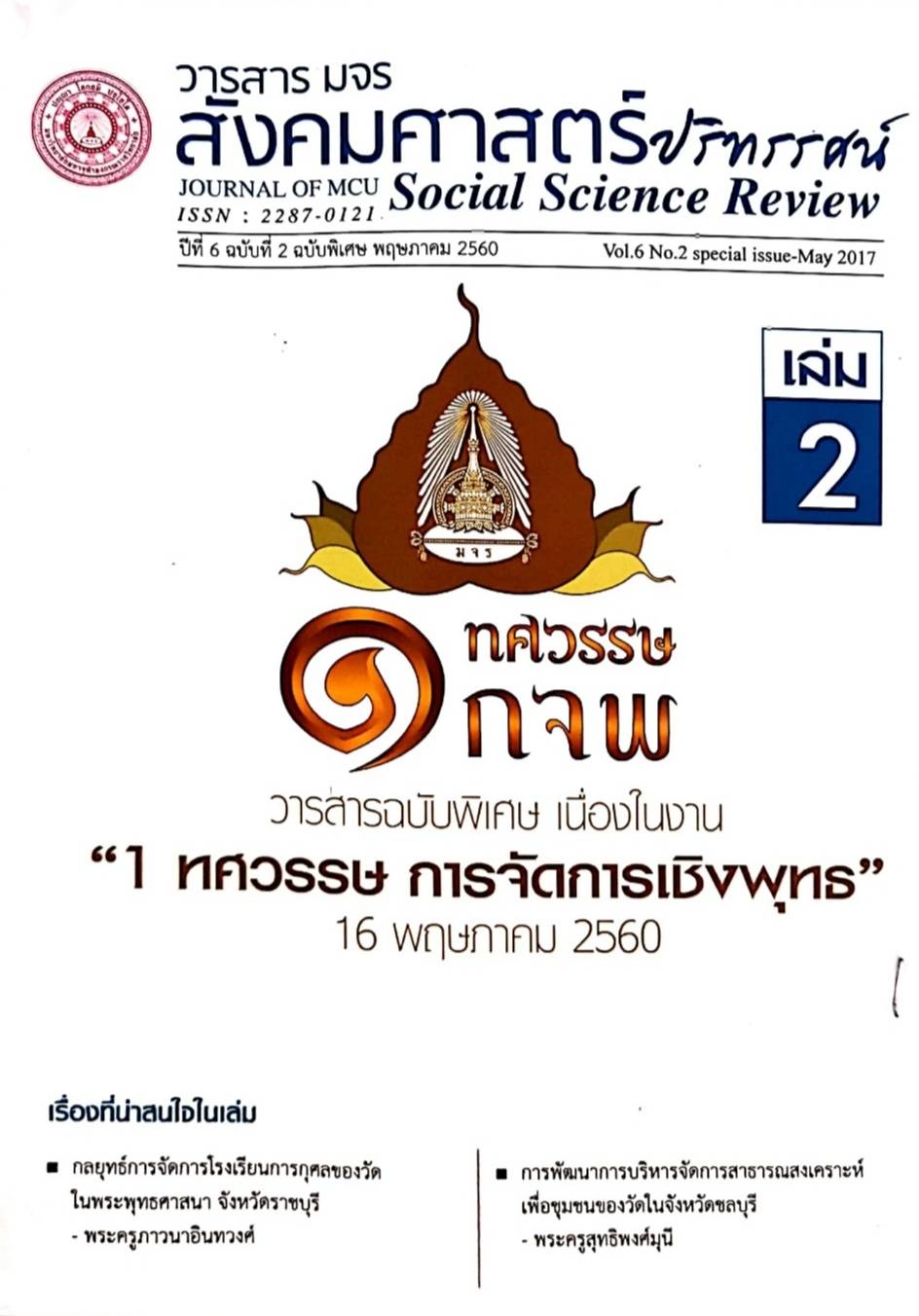การพัฒนาประสิทธิภาพการปฏิบัติงานด้านการปกครองของพระสังฆาธิการระดับอาเภอ ในเขตการปกครองคณะสงฆ์ ภาค 11
คำสำคัญ:
พระสังฆาธิการ, การพัฒนา, ประสิทธิภาพการปฏิบัติงานบทคัดย่อ
การวิจัยครั้งนี้มีวัตถุประสงค์เพื่อ 1) ศึกษาสภาพปัจจุบัน และปัญหาอุปสรรคการปฏิบัติงานของพระสังฆาธิการระดับอำเภอ ในเขตการปกครองคณะสงฆ์ภาค 11 2) ศึกษาหลักพุทธธรรมและทฤษฎีที่เกี่ยวข้องกับการปฏิบัติงานด้านการปกครองของพระสังฆาธิการ และ3) เพื่อนำเสนอแนวทางการพัฒนาประสิทธิภาพการปฏิบัติงานด้านการปกครองของพระสังฆาธิการระดับอำเภอ ในเขตการปกครองคณะสงฆ์ภาค 11
ผลการวิจัย พบว่า
1. สภาพปัจจุบันในการปฏิบัติงานด้านการปกครองโดยภาพรวมมีประสิทธิภาพอยู่ในระดับมาก (μ=4.16) ด้านที่มีค่าเฉลี่ยมากที่สุด คือ ด้านการระงับอธิกรณ์ชั้นเจ้าคณะตำบลส่วนด้านอื่นๆ อยู่ในระดับมากทุกด้าน ส่วนปัญหาอุปสรรคในการปฏิบัติงานด้านการปกครอง พบว่ามีปัญหาอุปสรรคทุกด้าน อันเนื่องจากมีความรู้ความเข้าใจในบทบัญญัติทางวินัยสงฆ์เกี่ยวกับการระงับอธิกรณ์ด้านต่าง ๆ ไม่ชัดเจน ทำให้มีความน่าเชื่อถือน้อยในกระบวนการตัดสินแก้ไขปัญหา ผู้ที่มีความเชี่ยวชาญ โดยเฉพาะมีน้อย และมีทักษะและเทคนิคในการให้คำปรึกษาการแก้ไขปัญหาข้อขัดข้องที่ต้องได้รับการพัฒนา นอกจากนั้นยังมีปัจจัยที่ส่งผลต่อประสิทธิภาพการปฏิบัติงาน คือ อายุของผู้ปฏิบัติหน้าที่ ปัญหาสุขภาพ ความรู้ความเข้าใจในบทบัญญัติทางวินัยสงฆ์ ตลอดทั้งทักษะและเทคนิคการปฏิบัติงานเฉพาะด้าน
2. หลักพุทธธรรมที่ประยุกต์ใช้กับการปฏิบัติงานด้านการปกครองของพระสังฆาธิการให้มี ประสิทธิภาพนั้นใช้หลักอิทธิบาท 4 ประกอบด้วย ฉันทะ ความพึงพอใจในการปฏิบัติงาน วิริยะ ความเพียร พยายามในการปฏิบัติงาน จิตตะ การเอาใจฝักใฝ่ในการปฏิบัติงาน วิมังสา การใคร่ครวญหาเหตุผลในการ ปฏิบัติงานอันเป็นความรับผิดชอบต่อหน้าที่การงาน ส่วนทฤษฎีที่เกี่ยวข้องกับการปฏิบัติงานด้านการปกครองของพระสังฆาธิการให้มีประสิทธิภาพ ใช้หลัก Deming Circle Theory : PDCA ประกอบด้วย P (Plan) มีการวางแผน เตรียมความพร้อม D (Do) มีการลงมือปฏิบัติ ดำเนินการให้เป็นไปตามแผน C (Check) มีการตรวจสอบผลการดำเนินงานตามแผน A (Act) มีการปรับปรุงแก้ไขตามแผนงานนั้น
3. แนวทางการพัฒนาประสิทธิภาพการปฏิบัติงานด้านการปกครองของพระสังฆาธิการระดับอำเภอ ในเขตการปกครองคณะสงฆ์ภาค 11 พบว่า ด้านการดำเนินการปกครอง มีแผนปฏิบัติงานที่ชัดเจน สอดคล้องกับสภาพสังคมปัจจุบัน มีผู้รับผิดชอบดำเนินการตามรูปแบบและกระบวนการตามแผนงานด้านการควบคุมและส่งเสริมกิจการคณะสงฆ์ มีการจัดอบรม สัมมนา ศึกษาดูงานแบบอย่างการปฏิบัติงานที่ดี มีระบบการติดตามดูแลให้ขวัญกำลังใจในการปฏิบัติงานชัดเจน ด้านการระงับอธิกรณ์จัดอบรม หลักสูตรการระงับอธิกรณ์สำหรับพระสังฆาธิการโดยเฉพาะ เพื่อเป็นแนวปฏิบัติให้ถูกต้องตามหลักพระธรรมวินัยและกฎหมายบ้านเมือง ด้านการแก้ไขข้อขัดข้องชั้นเจ้าคณะตำบล จัดอบรมระเบียบกฎหมาย หลักการ และกระบวนการคิดในการแก้ไขปัญหาที่ถูกต้องตามหลักพระธรรมวินัยและกฏหมายบ้านเมือง มีระบบเครือข่ายในการปฏิบัติงานให้สามารถแก้ปัญหาได้อย่างถูกต้องชัดเจนการควบคุมบังคับบัญชา กำหนดแนวทางข้อปฏิบัติที่ดีในการอยู่ร่วมกันที่ไม่ขัดต่อพระธรรมวินัยและกฎหมายบ้านเมือง พัฒนาทักษะและเทคนิคด้านต่าง ๆ ในการควบคุมบังคับบัญชา และการตรวจการและประชุมคณะสงฆ์ มีแผนการดำเนินงานตรวจการและแผนการประชุมคณะสงฆ์ชัดเจน มีการสรุปบันทึกและรายงานการตรวจการและการประชุมที่ชัดเจนเป็นปัจจุบัน
เอกสารอ้างอิง
พระครูสุตธรรมพิทักษ์ (น้ำผึ้ง สุธมฺโม). (2558). “การพัฒนาการปกครองคณะสงฆ์ในจังหวัดประจวบคีรีขันธ์”. วิทยานิพนธ์พุทธศาสตรดุษฎีบัณฑิต สาขาวิชาการจัดการเชิงพุทธ.บัณฑิตวิทยาลัย : มหาวิทยาลัยมหาจุฬาลงกรณราชวิทยาลัย.
พระโชติ บดีรัฐ. (2554). “การบริหารงานของพระสังฆาธิการในเขตการปกครองคณะสงฆ์ภาค 4 เพื่อความมั่นคงแห่งพระพุทธศาสนา”. วิทยานิพนธ์รัฐประศาสนศาสตรดุษฎีบัณฑิต.บัณฑิตวิทยาลัย : มหาวิทยาลัยราชภัฏวไลยลงกรณ์.
พระเทพปริยัติเมธี (สฤษฏิ์ สิริธโร). (2557). “กระบวนการสร้างความปรองดองในสังคมไทยตามรูปแบบพุทธวิธีการชำระอธิกรณ์. วิทยานิพนธ์พุทธศาสตรดุษฎีบัณฑิต สาขาวิชารัฐประศาสนศาสตร์. บัณฑิตวิทยาลัย : มหาวิทยาลัยมหาจุฬาลงกรณราชวิทยาลัย.
พระธรรมปิฎก (ป.อ. ปยุตฺโต). (2543). การเพิ่มประสิทธิภาพในการทางาน. กกรุงเทพฯ :ธรรมสภาและสถาบันลือธรรม.
พระพุทธวรญาณ (ทองย้อย กิตฺติทินฺโน). (2548). ธรรมญาณนิพนธ์ 100 ปีพระพุทธวรญาณ. พิมพ์ครั้งที่ 2. กรุงเทพฯ: โรงพิมพ์มหาวิทยาลัยธรรมศาสตร์.
วีรพงษ์ เฉลิมจิระรัตน์. (2547). การแก้ปัญหาแบบคิวซี :วิธีการแก้ปัญหาในงานตามแบบฉบับญี่ปุ่น. กรุงเทพฯ : สมาคมส่งเสริมเทคโนโลยี.
สำนักงานพระพุทธศาสนาแห่งชาติ. (2555). ทาเนียบพระสังฆาธิการ. กรุงเทพฯ : สำนักงานพระพุทธศาสนาแห่งชาติ.
ดาวน์โหลด
เผยแพร่แล้ว
รูปแบบการอ้างอิง
ฉบับ
ประเภทบทความ
สัญญาอนุญาต
ลิขสิทธิ์ (c) 2020 วารสาร มจร สังคมศาสตร์ปริทรรศน์

อนุญาตภายใต้เงื่อนไข Creative Commons Attribution-NonCommercial-NoDerivatives 4.0 International License.
เพื่อให้เป็นไปตามกฎหมายลิขสิทธิ์ ผู้นิพนธ์ทุกท่านต้องลงลายมือชื่อในแบบฟอร์มใบมอบลิขสิทธิ์บทความให้แก่วารสารฯ พร้อมกับบทความต้นฉบับที่ได้แก้ไขครั้งสุดท้าย นอกจากนี้ ผู้นิพนธ์ทุกท่านต้องยืนยันว่าบทความต้นฉบับที่ส่งมาตีพิมพ์นั้น ได้ส่งมาตีพิมพ์เฉพาะในวารสาร มจร สังคมศาสตร์ปริทรรศน์ เพียงแห่งเดียวเท่านั้น หากมีการใช้ภาพหรือตารางหรือเนื้อหาอื่นๆ ของผู้นิพนธ์อื่นที่ปรากฏในสิ่งตีพิมพ์อื่นมาแล้ว ผู้นิพนธ์ต้องขออนุญาตเจ้าของลิขสิทธิ์ก่อน พร้อมทั้งแสดงหนังสือที่ได้รับการยินยอมต่อบรรณาธิการ ก่อนที่บทความจะได้รับการตีพิมพ์ หากไม่เป็นไปตามข้อกำหนดเบื้องต้น ทางวารสารจะถอดบทความของท่านออกโดยไม่มีข้อยกเว้นใดๆ ทั้งสิ้น





